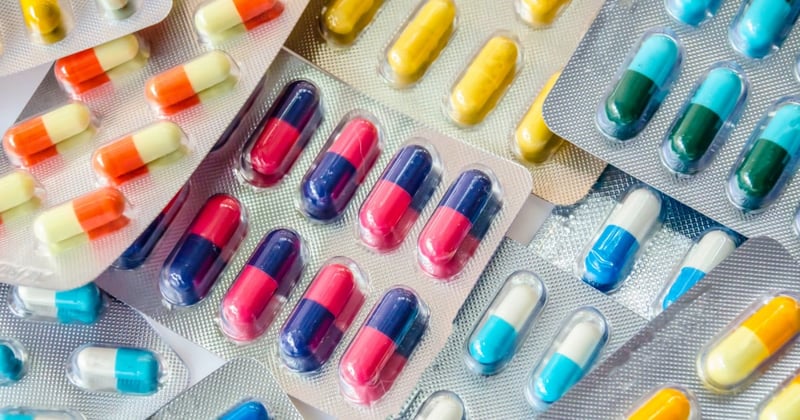
6 ways to help reduce antibiotic resistance
Blog
A guide to protecting our future health, planet, and animals.
This week is World Antibiotic Awareness Week (November 18-24), and with the theme of “Preventing antimicrobial resistance together” it’s the perfect time to examine our relationship with antibiotics and promote best practices to reduce the spread of antibiotic resistance.
Antibiotic resistance is a growing global health crisis that affects us all. The overuse and misuse of antibiotics have led to the emergence of drug-resistant superbugs, making infections harder to treat.
Antibiotic resistance is a growing global health crisis that affects us all. The overuse and misuse of antibiotics have led to the emergence of drug-resistant superbugs, making infections harder to treat.
You might be surprised to learn that about 75% of the antibiotics used here in Canada are used in animal agriculture. Often, these drugs are used to prop-up an intensive system that keeps animals in cramped and stressful conditions that would otherwise make them very sick. An increasing number of countries around the world have recognized the dangers of using antibiotics in this way. In fact, in 2022, the European Union banned the use of preventative antibiotics in farming to address the growing public health crisis of antibiotic resistance.
While we push Canadian policy-makers to similarly recognize the risk and protect these life-saving medicines, there are other ways we can each make a positive impact.
Protecting people and animals starts with you.
Here are seven practical ways you can help reduce antibiotic resistance and safeguard the effectiveness of these life-saving drugs:
1. Take antibiotics as prescribed:
Follow your healthcare provider's instructions when taking antibiotics. Never share antibiotics with friends or family members, and don't use antibiotics prescribed for someone else.
2. Properly dispose of leftover medications:
If you have leftover antibiotics or other medications, it’s important to dispose of them correctly. Medications that are thrown away improperly can have a negative impact on our ecosystems. Many communities have drug take-back programs or pharmacies that accept unused medications.
3. Practice good hygiene:
Proper handwashing, maintaining good personal hygiene, and food safety measures can help prevent infections. By reducing the number of infections, we decrease the need for antibiotics.
4. Get vaccinated:
Vaccines can prevent many infections that might otherwise lead to antibiotic use. Stay up to date with recommended vaccines for yourself and your family.
5. Support local, sustainable agriculture:
Choose food products from farms and suppliers that follow responsible antibiotic use practices for their animals. Supporting higher welfare and sustainable farming practices will help reduce the need for antibiotics in agriculture. Build a relationship with your local farmers and butchers who can provide information about the meat they sell. This direct connection can help you make informed choices about your meat purchases.
6. Explore plant-based protein sources:
Reduce your consumption of animal-based food and add more plant-based protein sources to your diet. Foods like legumes, tofu, and tempeh can be delicious and nutritious alternatives to meat. Reducing your meat consumption can decrease the demand for antibiotics in animal farming.
It's important to continue educating yourself about antibiotic resistance and share your knowledge with friends and family. The more people are aware of the issue, the more we can collectively work towards its solution.
Together, we can protect these vital medications and ensure they remain effective for years to come.
Are antibiotic-free (‘raised without antibiotic’) animal products a good choice?
In principle, antibiotic free animal products, such as those marketed as “raised without antibiotics (RWA)”, sound like a good option. However, these products are intended to fill a niche market for those consumers who want and will pay for antibiotic-free meat, and farmers are paid a premium for these products.
The concern is that this could lead to poor welfare outcomes when farmers are not motivated to treat a sick animal for fear of losing money, and animals can suffer as a result. Instead, we advocate for responsible antibiotic use across the whole supply chain. This means that sick animals get treated when needed, and prophylactic antibiotic use is not commonplace.
During World Antibiotic Awareness Week and beyond, it's crucial to raise awareness about the overuse of antibiotics in Canadian animal farming.
The irresponsible use of antibiotics in agriculture not only jeopardizes animal welfare but also poses a severe threat to human health. It's time for a collective effort involving government regulations, research, and consumer choices to combat antibiotic overuse and work towards a healthier, more sustainable future for both animals and humans.
Our report, ‘Reducing Antibiotic Use in Farming Through Improvements to Animal Welfare’, sheds light on this critical issue, highlighting the overuse of antibiotics in intensive animal agriculture and the opportunities to improve animal housing and management practices that would allow the reduction of antibiotic use.